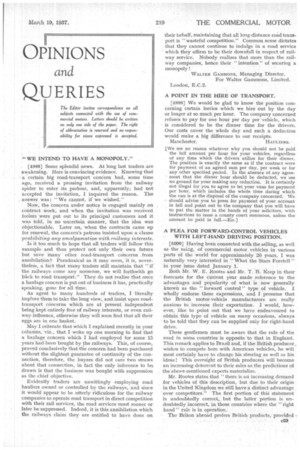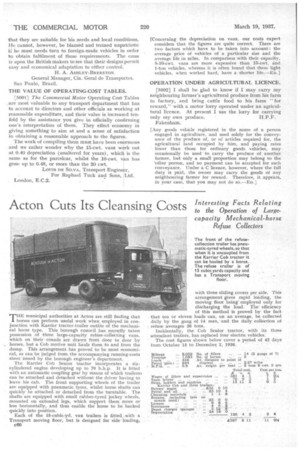OPINIONS
Page 109

Page 110

If you've noticed an error in this article please click here to report it so we can fix it.
and
QUERIES
"WE INTEND TO HAVE A MONOPOLY."
[4998] Some splendid news. At long last traders are awakening. Here is convincing evidence. Knowing that a certain big road-transport concern had, some time ago, received a pressing invitation from the railway spider to enter its parlour, and, apparently; had not accepted the invitation, I inquired the reason. The answer was : "We cannot, if we wished."
Now, the concern under notice is engaged mainly on contract work, and when the invitation was received feelers were put out to its principal customers and it was told, in no uncertain manner, that the idea was objectionable. Later on, when the contracts came up for renewal, the concern's patrons insisted upon a clause prohibiting any amalgamation with railway interests.
Is it too much to hope that all traders will follow this example and thus protect not only their own future but save many other road-transport concerns from annihilation? Paradoxical as it may seem, it is, nevertheless, a fact that Many traders still maintain that "if the railways come any nonsense, we will forthwith go back to road transport." • They do not realize that Once a haulage concern is put out of business it has, practically speaking, gone for all time.
As agent to many hundreds of traders, 1 literally implore them to take the long view, and insist upon roadtransport concerns which are at present independent being kept entirely free of railway interests, or even railway influence, otherwise they will soon find that all their eggs are in one basket.
May I reiterate that which I explained recently in your columns, viz., that I woke up one morning to find that a haulage concern which I had employed for some 15 years had been bought by he railways. This, of course, proved conclusively that the concern had been purchased without the slightest guarantee of continuity of the connection, therefore, the buyers did not care two straws about that connection, in fact the only inference to ha drawn is that the business was bought with suppression as the chief objective.
Evidently traders are unwittingly employing road hauliers owned or controlled by the railways, and since it would appear to be utterly ridiculous for the railway companies to operate road transport in direct competition with their rail services, the road services must sooner or later be suppressed. Indeed, it is this annihilation which the railways claim they are entitled to have done on
their behalf, maintaining that all king-distance road transport is "wasteful competition." Common sense dictates that they cannot continue to indulge in a road service which they affirm to be their downfall in respect of railway service. Nobody realizes that more than the railway companies, hence their " intention " of securing a moncipoly
WALTER GAMMONS, Managing Director, For Walter Gammons, Limited. London, E .C.2.
A POINT IN THE HIRE OF TRANSPORT.
[4999] We would be glad to know the position concerning certain lorries which we hire out by the day or longer at so much per hour. The company concerned refuses to pay for one hour per day per vehicle, which is considered to be the dinner time for the drivers. Our costs cover the whole day and such a deduction would make a big difference to our receipts.
Manchester. Harrasas. [We see no reason whatever why you should not be paid the full amount per hour for your vehicles, regardless of any time which the drivers utilize for their dinner. The position is exactly the same as if the contract were for payment of an agreed sum per day, per week or for any other specified period. In the absence of any agreement that the dinner hour should be deducted, we see no ground for your making any reduction. It is certainly not illegal for you to agree to let your vans for payment per hour, which includes the whole time during which the van is at the disposal of the company concerned, We should advise you to press for payment of your account in lull and point out to the company that you will have to put the matter in the hands of your solicitors, with instructions to issue a county court summons, unless the amount be paid in full.—En.]
A PLEA FOR FORWARD.CONTROL VEHICLES WITH LEFT-HAND DRIVING POSITION. •
[5000] Having been connected with the selling, as well as the using, of commercial motor vehicles in various parts of the world for approximately 20 years, I was naturally very interested in "What the Stars Foretell" in your issue dated January 1.
Both Mr. W. E. Rootes and Mr. T. B. Keep in their forecasts for the current year made reference to the advantages and popularity of what is now generally known as the "forward control" type of vehicle. I wholly endorse these expressions, and I presume that the British motor-vehicle manufacturers are really anxious to increase their exportation. I would, however, like to point out that we have endeavoured to obtain this type of vehicle on many occasions, always to be told that they can be supplied only for right-hand drive.
These gentlemen must be aware that the rule of the road in some countries is opposite to that in England. This remark applies to Brazil and, if the British producer wishes to compete here with American vehicles, he will most certainly have to change his steering as well as his ideas r This oversight of British producers will become an increasing deterrent to their sales as the predictions of the above-mentioned experts materialize.
Mr. Rotates states that "there is an increasing demand for vehicles of this description, but due to their origin in the United Kingdom we still have a distinct advantage over competitors." The first portion of this statement is undoubtedly correct, but the latter portion is undoubtedly incorrect, in those countries where the "right hand" rule is in operation.
The Briton abroad prefers British products, provided that they are suitable for his needs and local conditions. He cannot, however, be blamed and termed unpatriotic if he must needs turn to foreign-made vehicles in order to obtain fulfilment of these requirements. The onus is upon the British makers to see that their designs permit easy and economical adaptation to either control.
E. A. ASHLEY-BRERETON.
General Manager, Cia. Geral de Transportes. Sao Paulo, Brazil, THE VALUE OF OPERATING-COST TABLES.
[5001] The Commercial Motor Operating Cost Tables are most valuable to any transport department that has to account to directors and other officials as working at reasonable expenditure, and their value is increased tenfold by the assistance you give in officially confirming one's interpretation of them. They effect economy in giving something to aim at and a sense of satisfaction in obtaining a reasonable approach to the figures.
The work of compiling them must have been enormous and we rather wonder why the 15-cwt. vans wnrk out at 0.40 depreciation (unaltered for years), which is the same as for the parcekar, whilst the 10-cwt. van has gone up to 0.48, or more than the 30 cwt.
Louis riE SILVA, Transport Engineer, For Raphael Tuck and Sons, Ltd. London, E.C.2.
Concerning the depreciation on vans, our costs expert considers that the figures are quite correct. There are two factors which have to be taken into account: the average price of vehicles of a particular size and the average life in miles. In comparison with their capacity, 8-10-cwt. vans are more expensive than 15-cwt. and 1-ton vehicles, whereas it is often found that these light vehicles, when worked hard, have a shorter life.--ED.] OPERATION UNDER AGRICULTURAL LICENCE.
:5002] I shall be glad to know if I may carry my neighbouring farmer's agricultural produce from his farm to factory, and bring cattle food to his farm " for reward," with a motor lorry operated under an agricultural licence. At present I use the lorry for carrying
only my own produce. H.P.F. Fakenharn.
[Any goods vehicle registered in the name of a person engaged in agriculture, and used solely for the conveyance of the produce of, or of articles required for, the agricultural land occupied by him, and paying rates lower than those for ordinary goods vehicles, may occasionally be used to carry the produce of another farmer, but only a small proportion may belong to the 'other person, and no payment can be accepted for such conveyance. Under a C licence, however, where the full duty is paid, the owner may carry the goods of any neighbouring farmer for reward. Therefore, it appears, in your case, that you may not do so.—En.]
























































































































































